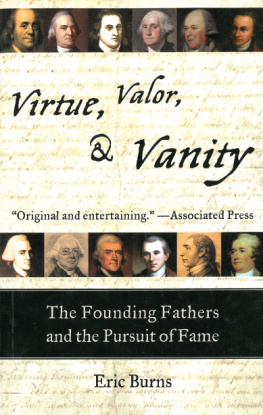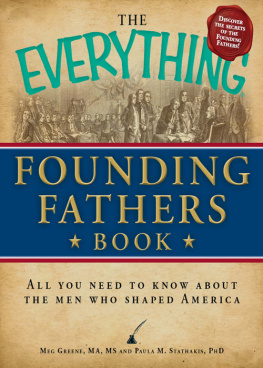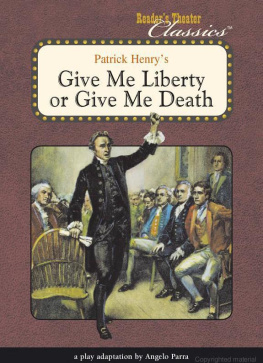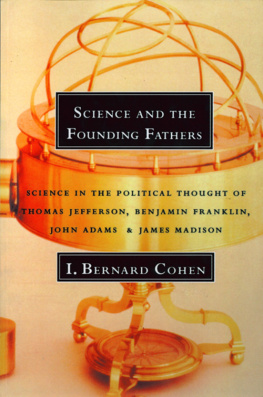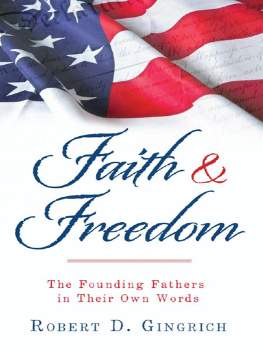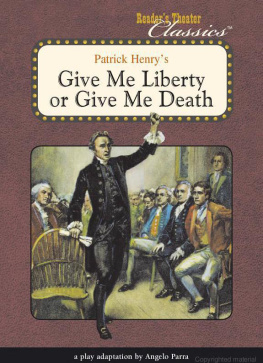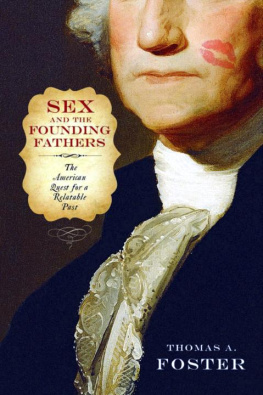


Copyright 2007 by Eric Burns
All rights reserved. No part of this book may be reproduced in any form or by any electronic or mechanical means, including information storage and retrieval systems, without permission in writing from the publisher, except by a reviewer who may quote brief passages in a review.
FIRST EDITION
Library of Congress Cataloging-in-Publication Data
Burns, Eric.
Virtue, valor, and vanity : the Founding Fathers and the pursuit of fame / Eric Burns. 1st ed.
p. cm.
Includes bibliographical references and index.
ISBN 978-1-55970-858-6 (alk. paper)
1. Founding Fathers of the United StatesBiography. 2. United StatesPolitics and government17751783. 3. United StatesPolitics and government 17831789. 4. VirtuePolitical aspectsUnited StatesHistory18th century. 5. CouragePolitical aspectsUnited StatesHistory18th century. 6. Pride and vanityPolitical aspectsUnited StatesHistory18th century. 7. Fame Political aspectsUnited StatesHistory18th century. I.Title.
E302.5.B87 2007
973.3dc22 2007022841
Published in the United States by Arcade Publishing, Inc., New York
Distributed by Hachette Book Group USA
Visit our Web site at www.arcadepub.com
10 9 8 7 6 5 4 3 2 1
Designed by API
EB
PRINTED IN THE UNITED STATES OF AMERICA
To Gerald E. Murray
whose poetry and courage are unsurpassed
CONTENTS
Introduction
The Crew of the Concord
H E WAS NOT THE FIRST E NGLISHMAN to see the New World, but he was one of the first to describe it in detail, to record his impressions as meticulously as if his concern had been history no less than exploration, and to preserve those impressions for all who followed. He wrote of the many pleasant Islands before him and of a coastline rocky and irregular. He wrote of forests and streams, trees and plants, wildlife and even wilder human beings, whom he regarded for the most part as benign but referred to as Savages. He wrote of prospects so pleasing in the Northern Parts of this Country that the captain of his ship did not trouble himself to undertake the discovery of the Southern.
His name was Gabriel Archer, and he set sail from Falmouth, England, on the Concord on March 26, 1602. According to one account he was accompanied by thirty-one other men, according to another by twenty-two; both accounts tell us that some of the men planned to stay behind, to settle in the New World and set up trading posts. They did not know where they would build them, what they would trade, or even who their trading partners would be.They were men seeking adventure in a faraway part of the globe. They would deal with specifics later.
The Concord arrived somewhere in Maine or Massachusetts, still known then as Virginia, on May 14. Before reaching the mainland, Archer and his mates, under the command of Bartholomew Gos-nold, drifted past several of those pleasant islands, which were for the most part uninhabited, and yet by their fruitfulness capable of maintaining a great number of People.
In fact, the islands did maintain a great number of people, and it didnt take the Englishmen long to meet them and find them like none they had ever seen before.Their Commander came boldly on board the Ship, Archer wrote. The Commander himself was dressd with Wast-coat, Breeches, Shoes, Stockins, hat, and all the Accoutrements of an European, but all the rest had only Deer-skins about their shoulders, and Seal-skins tied about their middles.They were painted, tho their natural swarthy colour was easily discernd; their hair very long, and tied up with a knot behind. Some of them spoke a crude form of English,Archer was pleased to relate, and their manner, if not quite friendly, was at least unthreatening.
He did not think as highly of the next group of natives he encountered.These were more finely deckd than the Former, having all of them Copper Pendants in their Ears; but one had a Breastplate of the same Metal a foot long, and half broad; and another had his Head all stuck with Feathers, that rendred him a very frightful Figure.They brought little trifles to Barter, but they were a shy, sly, thievish sort of People.
The encounter was free of incident, however.The sailors happily exchanged the natives trifles for their own, and the Concord sailed on, past more of the craggy coastline in this world so far from home.
Once again, Archer picked up his pen. He noticed a Lake of fresh Water almost a League in Circuit, and very near the Sea; in the midst of which is another little Island about an Acre in compass, and this [we] thought the most convenient place for the building for a Fort, and therefore began it here. About this Lake there was an infinite number of Tortoises, several sorts of Fowl and Fish too, so that those that livd here might have a fair prospect of Provisions enough.
More than the creatures, though, it was the land that impressed Archer:such sweeping vistas, so distant a horizon.Were the fields and hills and valleys as boundless as they seemed? What would it be like to ride the waves of terrain as they had ridden the waves of the ocean, to measure and map them, to follow them to the horizon and perhaps beyond it? What would they find? Archer could see so much farther here than in the Old World, which, depending on your frame of mind, was either an intimidating prospect or a bracing one.
When he looked in the other direction, behind him, he saw even more islands. They popped up from one minute to the next, all shapes and sizes, scattered in the water and so green in the spring sunlight that they glowed. One of them we know today as Marthas Vineyard. Captain Gosnold named another,a small unpeopled Spot, and over-run with Trees, in honor of Queen Elizabeth. It And there was yet more bounty: The Minerals were Copper, Emery-stones, Alabaster, together with some others of a blue Met-aline colour, which our Author knew not what to make of; some there were that said twas Steel ore, but they ought to have consid-erd that tho Gold Mines are very scarce, yet Steel Mines are certain much scarcer, and they are never found but where a Brass Mine lies either at the top or the bottom. Captain Gosnolds crew also found stones that could be used to build shelters and the walls to surround them.They would be safe here in addition to being well fed.
abounded with Trees of many kinds, which we see here in these Parts of the World, so the most remarkable of all were the Sassafras and the Cherry-trees, as they call them. The former are well known for their use in Physick, and are no rarities in this Island; the latter have this extraordinary in them, that together with the Leaf, Bark, and bigness, not different from ours in England, the Fruit grows at the end of the Stalk 40 or 50 in a cluster. The Vines were very numerous here too, and the more common Garden and wild Fruits in great abundance.
They would also be gainfully employed, or at least amused. As Archer noted, Elizabeth Island affords also Materials for Dying, and for Smoking; and no other yields finer Tobacco than this.The Main Land adjoining, which [we] visited also, was in all respects as charming, as curious Meadows, Groves, Brooks and Rivers coud make it.
This was what Gabriel Archer and the others aboard the Concord
Next page
